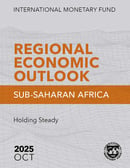This web page provides information in on the activities of the Office, views of the IMF staff, and the relations between Sierra Leone and the IMF. Additional information can be found on Sierra Leone and IMF country page, including official IMF reports and Executive Board documents in English that deal with Sierra Leone.
At a Glance
- Current IMF membership: 191 countries
- Sierra Leone joined the Fund in September 10, 1962. (Article VIII)
- Total quotas: SDR 207.4 million
- Outstanding loans and purchases: (SDR) 360.72 million (March 31, 2023)
- Last Article IV Consultation: The last Article IV Executive Board Consultation was on June 27, 2022. (Country Report No. 2022/259, July 29, 2022)
Office Activities
Blog post done by IMF's FDMD's, David Lipton, after his visit to Sierra Leone and Niger.
February 26, 2020
Politico SL reports on IMF's FDMD's visit to Sierra Leone
The interview: IMF’s number 2 man talks on Sierra Leone’s economy
January 31, 2020
Sierra Leone and the IMF
No results found. Either there was an error with the web service or there is no data returned by the web service.
Regional Economic Outlook for Sub-Saharan Africa
October 16, 2025

The outlook for Sub-Saharan Africa is showing resilience, despite a challenging external environment with uneven prospects in commodity prices, still tight borrowing conditions, and a deterioration of the global trade and aid landscape.
Read the Report
Departmental Papers on Africa
 The Departmental African Paper Series covers research on sub-Saharan Africa conducted by International Monetary Fund (IMF) staff, particularly on issues of broad regional or cross-country interest. The views expressed in these papers are those of the author(s) and do not necessarily represent the views of the IMF, its Executive Board, or IMF Management.
The Departmental African Paper Series covers research on sub-Saharan Africa conducted by International Monetary Fund (IMF) staff, particularly on issues of broad regional or cross-country interest. The views expressed in these papers are those of the author(s) and do not necessarily represent the views of the IMF, its Executive Board, or IMF Management.



